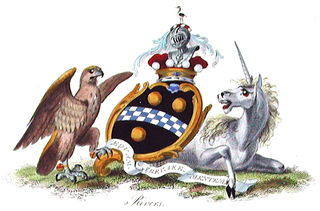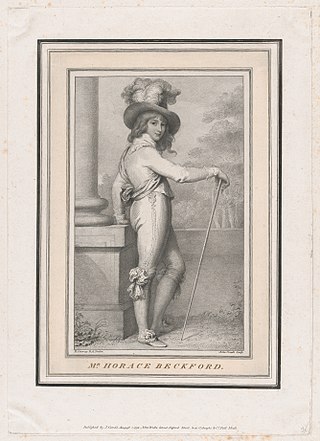
Lieutenant General Augustus Henry Lane Fox Pitt Rivers was an English officer in the British Army, ethnologist, and archaeologist. He was noted for innovations in archaeological methodology, and in the museum display of archaeological and ethnological collections. His international collection of about 22,000 objects was the founding collection of the Pitt Rivers Museum at the University of Oxford while his collection of English archaeology from the area around Stonehenge forms the basis of the collection at The Salisbury Museum in Wiltshire.

Baron Vernon, of Kinderton in the County of Chester, is a title in the Peerage of Great Britain. It was created in 1762 for the former Member of Parliament George Venables-Vernon. He had previously represented Lichfield and Derby in the House of Commons. Born George Vernon, he was the son of Henry Vernon, of Sudbury in Derbyshire, and Anne Pigott, daughter and heiress of Thomas Pigott by his wife Mary Venables, sister and heiress of Sir Peter Venables, Baron of Kinderton in Cheshire. In 1728, he assumed by Royal Licence the additional surname of Venables upon inheriting the Venables estate in Cheshire from his childless cousin Anne, widow of the 2nd Earl of Abingdon.
Baron Killearn, of Killearn in the County of Stirling, is a title in the Peerage of the United Kingdom. It was created in 1943 for the diplomat Sir Miles Lampson. He was the second son of Norman Lampson, youngest son of Sir Curtis Lampson, 1st Baronet, of Rowfant. Lord Killearn's eldest son, the second Baron, succeeded his second cousin once removed as fourth Baronet in 1971. On his death the titles passed to his half-brother, the third and present holder of the barony and baronetcy.

Viscount Clifden, of Gowran in the County of Kilkenny, Ireland, was a title in the Peerage of Ireland. It was created on 12 January 1781 for James Agar, 1st Baron Clifden. He had already been created Baron Clifden, of Gowran in the County of Kilkenny, in 1776, also in the Peerage of Ireland. The Viscounts also held the titles of Baron Mendip in the Peerage of Great Britain from 1802 to 1974 and Baron Dover from 1836 to 1899, when this title became extinct, and Baron Robartes from 1899 to 1974, when this title became extinct, the two latter titles which were in the Peerage of the United Kingdom. The interrelated histories of the peerages follow below.

Tollard Royal is a village and civil parish on Cranborne Chase, Wiltshire, England. The parish is on Wiltshire's southern boundary with Dorset and the village is 6 miles (10 km) southeast of the Dorset town of Shaftesbury, on the B3081 road between Shaftesbury and Sixpenny Handley.
John Thomas Townshend, 2nd Viscount Sydney of St Leonards was a British peer and Member of Parliament.

Baron Rivers was a title that was created four times in British history, twice in the Peerage of England, once in the Peerage of Great Britain and once in the Peerage of the United Kingdom.
Julian Alfred Lane Fox Pitt-Rivers was a British social anthropologist, an ethnographer, and a professor at universities in three countries.

George Pitt, 1st Baron Rivers was an English diplomat, politician, military officer and peer who served as the British ambassador to Spain from 1770 to 1771.

George Lane-Fox, of Bramham Park, Yorkshire, was a British landowner and Tory politician.
George Pitt-Rivers, 4th Baron Rivers, known as George Beckford until 1828, was a British peer and politician. He held a place as a Lord-in-waiting in several governments, migrating from the Tory to the Liberal Party over the course of his career. He commanded the Dorsetshire Yeomanry Cavalry for a decade. His four sons all suffered from a lung disease, and only the youngest briefly survived him to inherit the barony.
Rosalind Venetia Lane Fox Pitt-Rivers FRS (née Henley; 4 March 1907 – 14 January 1990) was a British biochemist. She became the second president of the European Thyroid Association in 1971; she succeeded Jean Roche and was followed by Jack Gross in this position, all three names inextricably linked with the discovery of the thyroid hormone triiodothyronine (T3).
Lane Fox or Lane-Fox is a double-barrelled English surname. Notable bearers of the surname include:
St George William Lane Fox-Pitt was a British electrical engineer and student of psychic phenomena.

William Horace Pitt-Rivers, 3rd Baron Rivers, known as Horace Beckford until 1828, was a British peer and planter.
Horace Pitt-Rivers, 6th Baron Rivers, known as Horace Beckford until 1828 and Hon. Horace Pitt from 1828 until 1867, was a British peer and army officer.
James Fox-Lane, known as James Fox until 1773, was an English landed gentleman, who represented Horsham in Parliament for six years.
George Henry Lane-Fox Pitt-Rivers was a British anthropologist and eugenicist who was one of the wealthiest men in England in the interwar period. He embraced anti-Bolshevism and anti-Semitism and became a supporter of Oswald Mosley, which led to him being interned by the British government for two years during the Second World War.

The Smith family is an English aristocratic and banking family founded by Thomas Smith (1631–1699), the founder of Smith's Bank of Nottingham. Its members include the Marquess of Lincolnshire (extinct), the Viscount Wendover (extinct), the Barons Carrington, the Baron Pauncefote (extinct), the Barons Bicester, the Bromley baronets and many Members of Parliament. Originally named Smith, the branch of the Barons Carrington assumed the surname Carington, the branch of the Bromley baronets the surname Bromley and the branch of the Baron Pauncefote the surname Pauncefote.








